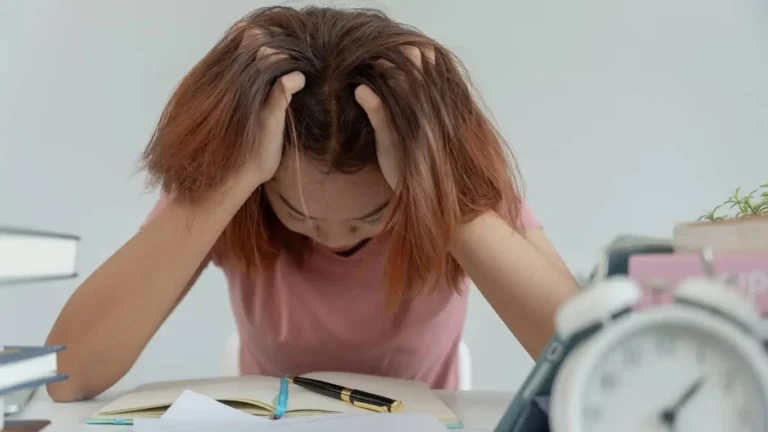Can GERD Cause Fatigue? Shocking Link Between Reflux & Exhaustion
If you’ve ever left work more tired than when you arrived, you’re not alone. I’ve spent years working in a Gastroenterology clinic, and let me tell you—so many of our patients walked in thinking they were just “tired all the time,” only to find out there was a sneaky culprit behind it: GERD. Yep, can GERD cause fatigue? Absolutely, and it happens more often than most people realize. I’ve seen patients struggling to keep their eyes open at 2 PM, thinking they just needed more sleep, but the issue was much deeper. Let’s talk about why your acid reflux might be zapping your energy.
What is GERD, Really?

We all know that heartburn-y, acidic feeling that creeps up your chest after a big meal. That’s acid reflux. But GERD—or Gastroesophageal Reflux Disease—is more than the occasional spicy food regret. It’s chronic. It’s disruptive. And it doesn’t just mess with your digestion—it can affect your whole body, including your energy levels.
In my day-to-day with patients, I’d often explain GERD like this: your stomach acid is supposed to stay in your stomach. But in GERD, that acid pushes up into your esophagus, often due to a weak lower esophageal sphincter (LES). The result? Ongoing irritation, inflammation, and a bunch of symptoms that most folks wouldn’t immediately connect to reflux. Fatigue is one of them.
How GERD Could Be Draining Your Energy

The Sleep Disruption Factor
This one came up a lot in patient conversations. “I wake up at 3 a.m. feeling like something’s burning in my throat.” Sound familiar? GERD symptoms are notorious for flaring up at night. That acid creeps up easier when you’re lying flat, which means disrupted sleep, frequent waking, and sometimes full-on insomnia.
And let’s be real: if your sleep is trash, your energy the next day is going to follow suit. Sleep is when your body repairs itself, recharges, and resets. Constant interruptions due to GERD? It’s like trying to charge your phone with a frayed cable. You’re never really at 100%.
Chronic Inflammation and Systemic Effects
This isn’t something people often think about, but it’s big. When your esophagus is constantly irritated, your body goes into defense mode. That means inflammation—and chronic inflammation can mess with your immune system and make you feel sluggish overall. I’ve had patients say they felt like they had the flu without the fever. All they wanted to do was nap.
Your body is expending energy trying to “fix” the irritated tissue caused by the acid, which leaves less energy for everything else—like, I don’t know, living your life!
Malabsorption and Nutrient Deficiencies
Here’s something I wish more people understood: GERD doesn’t just cause heartburn. It can mess with how your body absorbs nutrients. Between acid-blocking medications and chronic inflammation in your gut, it’s not uncommon for patients to end up with low levels of iron, magnesium, or vitamin B12—all of which are essential for energy production.
We’d often run labs and find patients were borderline anemic or had B12 deficiencies. No wonder they felt like zombies! And this was after years of being told “it’s probably just stress.”
Wait, So GERD and Fatigue Are Connected?

Yep, and not just in a “kind of makes sense” way. There are multiple direct and indirect pathways where GERD contributes to feeling tired all the time. If you’ve ever wondered, can GERD cause fatigue, it’s not just wishful thinking—it’s backed by what we see clinically every day. Here’s how it typically unfolds:
- Nighttime reflux disrupts sleep, causing poor rest
- Chronic inflammation leads to general malaise
- Medication side effects contribute to fatigue
- Deficiencies in key nutrients impact cellular energy
- Daily discomfort wears you down mentally and physically
And this isn’t rare. I’ve seen it play out again and again. Patients come in thinking they’re just overworked or depressed—and yes, mental health is important too—but once we start treating the GERD, their energy often comes back. Sometimes dramatically.
My Personal Take as a Medical Assistant
From behind the front desk to assisting during procedures, I’ve heard it all—from the exhausted mom who thought she had chronic fatigue syndrome, to the truck driver who couldn’t stay awake on long drives. When we dug deeper, GERD was often lurking in the background. I started to notice patterns that weren’t always obvious in textbooks but were crystal clear in real-life cases.
One patient in particular stands out. She was in her late 30s, always tired, barely making it through her shifts. She thought it was just parenting stress. But once we got her reflux under control? Total 180. She said it was like a fog had lifted. Her story really stuck with me, because it reminded me how easily GERD symptoms can be brushed off or misattributed.
What This Means for You
If you’re dealing with chronic fatigue and haven’t looked into your digestive health, now might be the time. Whether it’s mild acid reflux or full-blown GERD, it could be a key factor messing with your energy. Don’t settle for “just being tired.” Start asking the right questions—and bring them up with your doctor. Seriously, advocate for yourself. I’ve seen what happens when people finally connect the dots, and it’s a game-changer.
Why Fatigue from GERD Gets Overlooked

This is something I saw happen way too often in our clinic. Someone comes in with exhaustion, low energy, maybe even a little brain fog, and the usual suspects get blamed first—stress, overwork, not enough sleep. GERD? Hardly anyone connects the dots. And to be fair, it’s not always an obvious link.
But here’s what’s wild: once you’ve seen the pattern a few times, it’s hard to unsee it. I remember a guy in his 40s who came in for “gut stuff” but casually mentioned being tired all the time. He thought it was because he had a new baby at home. Makes sense, right? But after reviewing his history—late-night reflux, trouble sleeping, popping antacids like candy—it clicked. We started him on treatment for GERD, and within weeks, he felt sharper and more energized. Total surprise to him.
GERD Doesn’t Always Shout—Sometimes It Whispers
Not everyone with GERD has those fiery, textbook heartburn symptoms. Some just feel a little bloated, get a mild sore throat in the mornings, or—yep—experience unexplained fatigue. These “silent” GERD symptoms often lead to misdiagnosis or no diagnosis at all. And while that happens, the underlying issue continues to chip away at your energy levels.
Common Triggers That Could Be Making Things Worse

If you’re wondering why your reflux seems to come and go—or why it suddenly got worse—there’s usually a trigger hiding in plain sight. Some of the most common ones I’ve seen in patients are:
- Eating too close to bedtime – This one’s huge. I’ve had to remind patients (and myself!) that lying down after a heavy meal is practically an invitation for reflux.
- Trigger foods – Think spicy dishes, tomato sauces, chocolate, mint, coffee, and fried stuff. Basically, all the delicious things. Sadly, they’re also major reflux triggers.
- Smoking – Smoking relaxes the lower esophageal sphincter, which makes it easier for acid to sneak up.
- Wearing tight clothes – Sounds silly, but waistbands that squeeze your stomach can increase pressure and push acid upward.
- Stress and anxiety – I’ve seen more than a few patients whose reflux flares during rough patches. Cortisol messes with digestion more than people realize.
And here’s the thing: every time GERD symptoms flare, your sleep can suffer. Your body goes into high alert trying to handle the discomfort. And slowly, silently, you start running on empty.
Managing GERD to Fight the Fatigue

One of the most empowering things I’ve seen is when a patient finally takes control of their GERD—not just with meds, but with lifestyle changes. It’s not always easy, but wow, can it make a difference.
Step One: Fix the Sleep
So many people don’t realize that sleep posture makes a difference. Elevating the head of your bed by 6-8 inches (not just using extra pillows—those just bend your neck) can help keep acid down where it belongs. We’d recommend wedge pillows all the time at the clinic. And it really works.
Also, cutting off meals 2-3 hours before bedtime is a game changer. One of our regulars swore that one change alone gave her deeper sleep and fewer 3 a.m. wakeups.
Step Two: Get a Handle on Your Triggers
This part takes some detective work. I’d always suggest patients keep a food journal—just for a couple of weeks. Write down what you eat, when symptoms pop up, and how you feel. Patterns show up fast. Some folks can tolerate tomatoes but can’t touch garlic. Others are fine with spicy food but get nailed by peppermint tea. Wild how individual it is.
Step Three: Talk to a Specialist
Seriously, don’t tough it out. Primary care is great, but if fatigue and reflux are both on your radar, getting a referral to a gastroenterologist can make a huge difference. We’d see so many patients who had suffered for years thinking their symptoms were normal. Trust me, constant fatigue is not just part of aging or “mom life.” If your gut isn’t happy, your whole body pays the price.
Real Talk: What Patients Wish They Knew Sooner
After years in the field, I’ve had plenty of candid convos with patients about what they wish someone told them early on. Here’s a quick list that’s come up again and again:
- Fatigue can absolutely be a symptom of GERD. Don’t let anyone brush it off.
- Medications help, but they’re not the whole solution. Lifestyle matters more than you think.
- You don’t have to feel like this forever. With the right approach, most people feel better in weeks—not years.
- Chronic reflux can lead to bigger problems if ignored—like esophagitis or Barrett’s esophagus.
- Listen to your body. It’s always sending signals—you just have to know how to read them.
It honestly feels good when someone walks in tired and frustrated, and after a few visits and the right treatment plan, they walk out smiling, sleeping better, and feeling human again. That’s what made the long days in the clinic worth it.
The Takeaway So Far
If you’ve been wondering, can GERD cause fatigue, the answer is a loud and clear YES. Between sleep disruptions, nutrient absorption issues, inflammation, and just the overall toll it takes on your system—GERD can absolutely leave you feeling like you’re running on fumes.
But the good news? It’s manageable. And with a bit of guidance and some lifestyle tweaks, you can start to reclaim your energy. GERD doesn’t have to own your day—or your night.
When to Suspect GERD Is Behind Your Fatigue

Let’s be honest, feeling tired these days feels like the norm. Between long work hours, never-ending notifications, and everything else life throws at us, it’s easy to chalk up fatigue to just “being busy.” But if you’re constantly dragging, especially paired with any kind of digestive discomfort, you have to ask yourself: could GERD be to blame?
Here are some signs I’ve seen pop up again and again in patients whose fatigue was linked to reflux:
- You wake up feeling just as tired as when you went to bed
- You’re dealing with heartburn more than twice a week
- You feel bloated or gassy, especially after meals
- You’re using antacids like breath mints
- Your sleep gets interrupted by chest burning or coughing
If any of that hits close to home, it might be time to look a little deeper. GERD isn’t always loud and dramatic—sometimes it’s the subtle things that wear you down over time.
How to Talk to Your Doctor About GERD and Fatigue

This is a big one. I’ve lost count of how many patients would come in unsure how to bring it up. I’d hear things like, “I didn’t want to seem dramatic,” or “I figured being tired is normal.” But trust me—doctors want the full picture. If something feels off, speak up.
Make It Specific
Instead of just saying, “I’m tired,” try something like:
- “I’ve been unusually fatigued for the last couple of months, and I also have frequent heartburn.”
- “I wake up several times a night with acid reflux, and I never feel rested in the morning.”
- “Even with 8 hours of sleep, I feel completely wiped out, and I’ve noticed my GERD has been worse lately.”
It makes it easier for your provider to connect the dots when you give context. Even better if you can keep a symptom diary for a week or two. Some patients would even jot down what they ate, how they slept, when symptoms hit, and how their energy levels felt. That kind of info can be a game-changer during a medical visit.
Don’t Be Afraid to Ask for Labs
It’s not just about the acid. Remember, GERD can affect nutrient absorption. Low iron? B12? Magnesium? All that can show up as fatigue. And a quick blood test can catch it early. I’d always encourage patients to ask, especially if fatigue was part of their story. Catching a deficiency early often meant a faster bounce-back.
Natural Approaches That Can Help
Medications absolutely have their place—I’ve seen them work wonders—but I’m also a big believer in a full-body approach. Lifestyle and diet tweaks can work hand-in-hand with treatment and sometimes make the biggest difference long-term.
Try These Strategies:
- Eat smaller meals – Large meals increase pressure in the stomach, which can worsen reflux.
- Stay upright after eating – Give gravity a chance to help your digestion.
- Reduce caffeine and alcohol – Both can relax the lower esophageal sphincter, making reflux more likely.
- Practice stress reduction – Whether it’s yoga, journaling, or just unplugging for 10 minutes, stress can make GERD and fatigue worse.
- Stay hydrated – Dehydration can compound tiredness and affect digestion, especially if you’re taking PPIs or antacids.
One patient of ours actually joined a local walking group and started meditating for 10 minutes each morning. Not only did her GERD flare-ups reduce, but she started feeling more energized within two weeks. Sometimes it’s not about doing more—it’s about doing what helps your body heal.
Long-Term Outlook: What You Can Expect
The good news? Most people who actively manage their GERD—whether it’s with meds, lifestyle changes, or both—start seeing improvements in their energy levels. In the clinic, it was always awesome to see someone come back and say, “I didn’t realize how bad I felt until I started feeling better.” That moment of clarity is so rewarding.
Of course, every case is different. Some people need to adjust their medications. Others need to get a sleep study. A few might need further testing like an endoscopy or pH monitoring. But it’s all about building that foundation of awareness—knowing that GERD and fatigue are connected and that relief is possible.
Consistency Beats Perfection
One thing I always told patients: don’t stress about being perfect. If you’re trying to manage GERD and feel better, consistency matters more than perfection. Slip-ups happen. Life happens. But if you keep coming back to what works for you, your body will thank you for it.
Helpful Resources & Next Steps
- National Institutes of Health (NIH) – Research-backed insights on GERD and digestive health.
- Health.com – Lifestyle tips and wellness guidance that’s easy to digest (pun intended).
- CDC – General health recommendations and updates.
If you’re still asking yourself, can GERD cause fatigue, the answer is a firm yes—backed by science, real patient stories, and clinical experience. But the best part? You’re not stuck feeling this way forever. Take that first step, get curious about your symptoms, and don’t hesitate to seek help. You deserve to feel better—truly rested, energetic, and in control of your health.
Disclaimer
This article is based on personal experience and general clinical knowledge. It is not intended as a substitute for professional medical advice, diagnosis, or treatment. Always consult a qualified healthcare provider with any questions you may have regarding a medical condition.

Camellia Wulansari is a dedicated Medical Assistant at a local clinic and a passionate health writer at Healthusias.com. With years of hands-on experience in patient care and a deep interest in preventive medicine, she bridges the gap between clinical knowledge and accessible health information. Camellia specializes in writing about digestive health, chronic conditions like GERD and hypertension, respiratory issues, and autoimmune diseases, aiming to empower readers with practical, easy-to-understand insights. When she’s not assisting patients or writing, you’ll find her enjoying quiet mornings with coffee and a medical journal in hand—or jamming to her favorite metal band, Lamb of God.







